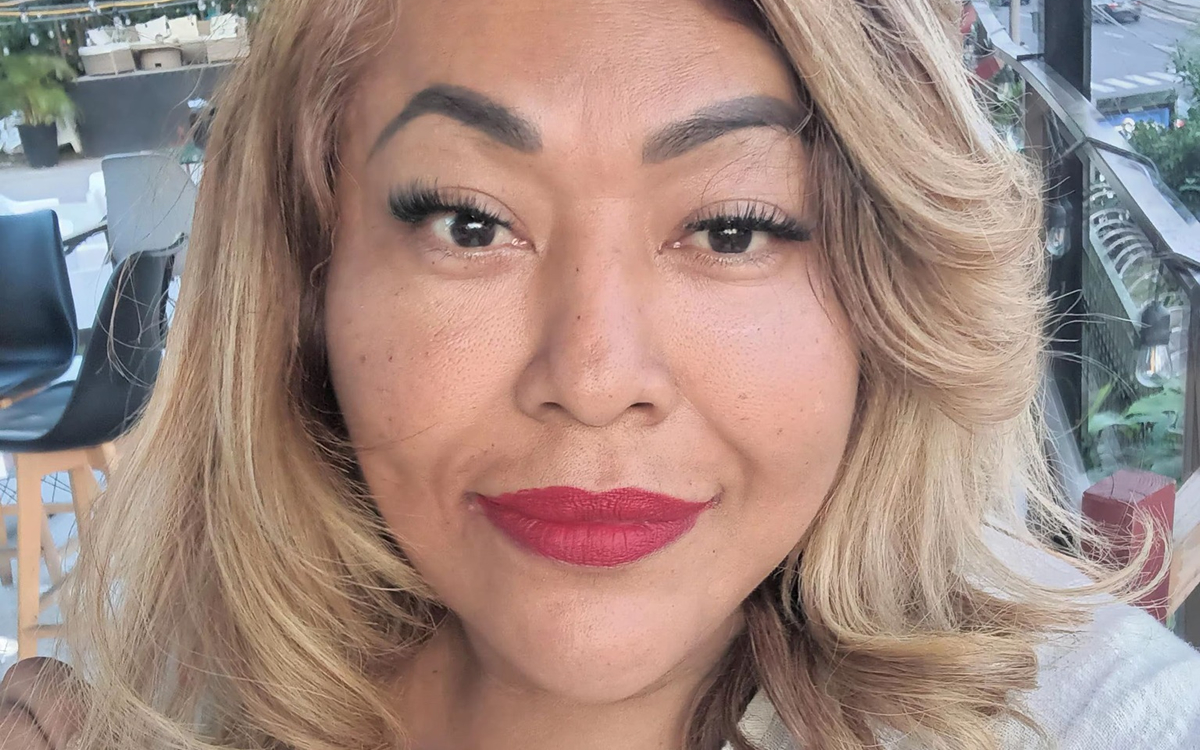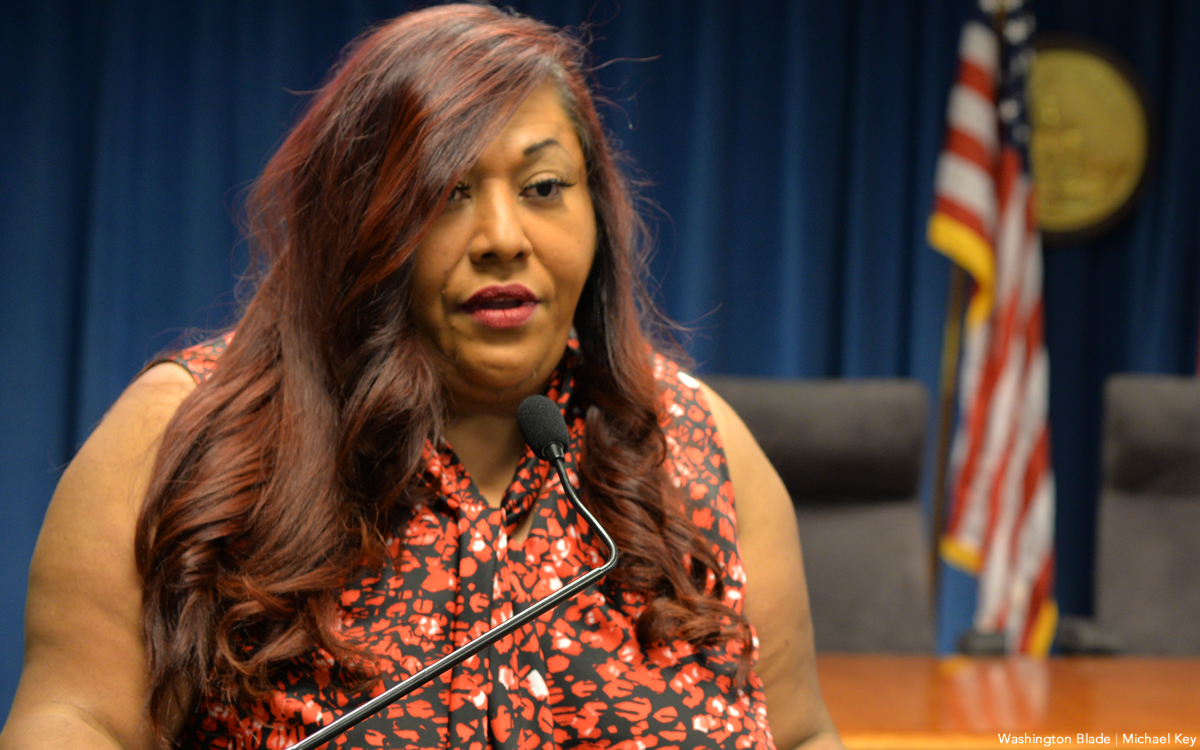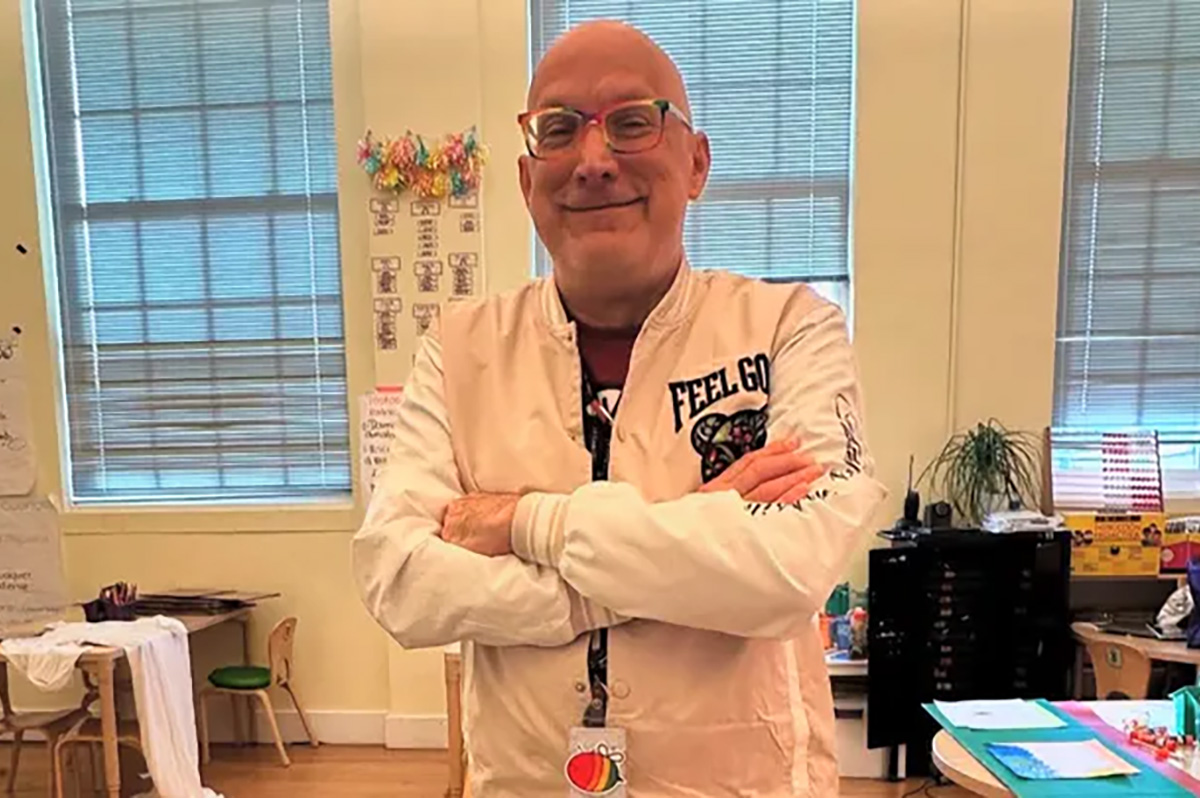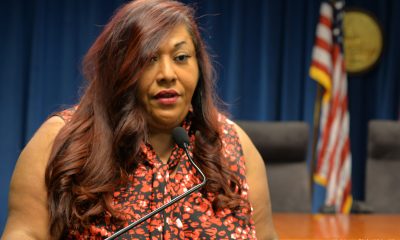District of Columbia
Ruby Corado pleads guilty to wire fraud in plea agreement
Reduced charge says she stole at least $150,000 in COVID-relief funds

Ruby Corado, the founder and executive director of the now-defunct LGBTQ community services organization Casa Ruby, pleaded guilty Wednesday, July 17, to a single charge of wire fraud as part of a plea bargain deal offered by prosecutors with the Office of the United States Attorney for the District of Columbia.
The charge to which she pleaded guilty in U.S. District Court for D.C. says she diverted at least $150,000 “in taxpayer-backed emergency COVID relief funds to private off-shore bank accounts for her personal use,” according to a statement released by the U.S. Attorney’s office.
Court records show that U.S. District Court Judge Trevor N. McFadden, who is presiding over the case, has scheduled a sentencing hearing for Jan. 10, 2025.
Corado’s guilty plea came a little over six weeks after prosecutors on May 31 filed a one-count criminal information charge of wire fraud against her that replaced an earlier criminal complaint charging her with bank fraud, money laundering, monetary transactions in criminally derived proceeds, and failure to file a required report of a foreign bank account.
The earlier complaint was filed at the time the FBI arrested Corado on March 5 of this year at a hotel in Laurel, Md., shortly after she returned to the U.S. from El Salvador. The initial complaint, like the new criminal information that replaced it, accused Corado of diverting at least $150,000 of federal pandemic relief funds to her own bank accounts in El Salvador. The charges say the funds were intended for use by Casa Ruby to support indigent LGBTQ clients in need of housing and other support services.
At the request of Corado’s court-appointed attorney and against the wishes of federal prosecutors, who said Corado would be a flight risk, another judge agreed to release Corado into the custody of her niece in Rockville, Md., under a home detention order. The release order came seven days after Corado had been held in jail since the time of her arrest on March 5.
In addition to a prison sentence, the charge of wire fraud also includes a possible penalty of financial forfeiture for which Corado could be required to pay restitution to the government. The plea agreement filed in court includes this statement to Corado’s attorney: “Specifically, your client agrees to the entry of a forfeiture money judgment in an amount ordered by the Court, which is equal to the value of any property which constitutes or is derived from proceeds traceable to the offense in Count One of the Information in which your client is pleading guilty.”
However, legal observers have said that under a plea agreement like the one offered to Corado, prosecutors most likely will ask the judge for a lesser sentence. Corado’s attorney is also expected to point out that this is a nonviolent, first-time offense for Corado, which merits a lesser sentence.
Corado has denied wrongdoing in her operation of Casa Ruby in response to a separate civil complaint filed against her and Casa Ruby by the Office of the D.C. Attorney General. That complaint is still pending in D.C. Superior Court.
In its July 17 statement the U.S. Attorney’s office refers to court documents showing that Corado, “on behalf of Casa Ruby, received more than $1.3 million from the Paycheck Protection Program and the Economic Injury Disaster Loan program.” The statement adds, “Instead of using the funds as she promised, Corado stole at least $150,000 by transferring the money to bank accounts in El Salvador, which she hid from the IRS.”
The statement says that in 2022, “when financial irregularities at Casa Ruby became public, Corado sold her home in Prince George’s County and fled to El Salvador.” It says FBI agents arrested her at the hotel in Laurel, Md. on March 5 “after she unexpectedly returned to the United States.”
District of Columbia
Ruby Corado sentencing postponed for third time
Attorneys say former Casa Ruby director has ‘significant medical issues’

A federal judge on April 8 approved a request by defense attorneys to postpone the sentencing of Ruby Corado, the founder and executive director of the now closed D.C. LGBTQ community services organization Casa Ruby on a charge of wire fraud, from April 29 to July 29.
Court records show that Judge Trevor N. McFadden of the U.S. District Court for the District of Columbia approved a motion filed by Corado’s two defense attorneys on that same day calling for the sentencing postponement on grounds of health issues.
“Ms. Corado has significant medical issues,” the April 8 motion states. “She has an important medical appointment related to one of her diagnoses scheduled in June 2025 and will need time to recover from that appointment,” it says.
The motion gives no further details on Colorado’s medical issues. A.J. Kramer, director of the D.C. Office of the Federal Public Defender, whose attorneys are representing Corado, said the office has a policy of never disclosing specific medical related information regarding its clients.
Court records show that prosecutors with the Office of the U.S. Attorney for D.C. did not object to the defense motion seeking the third sentencing postponement.
The records show that an earlier postponement of the sentencing, from March 28 to April 29, was initiated by the judge due to a scheduling conflict. The first postponement from Jan. 10 to March 28 came at the request of Corado’s attorneys, court records show.
Corado pleaded guilty on July 17, 2024, to a single charge of wire fraud as part of a plea bargain deal offered by prosecutors. The charge to which she pleaded guilty says she allegedly diverted at least $150,000 “in taxpayer backed emergency COVID relief funds to private offshore bank accounts for her personal use,” according to a statement released by the U.S. Attorney’s office.
Prosecutors have said funds that Corado allegedly diverted for her own use were intended to be used by Casa Ruby in support of its various programs, including housing services for homeless LGBTQ youth and support for LGBTQ immigrants.
The U.S. Attorney’s statement also notes that in 2022, when “financial irregularities at Casa Ruby became public,” Corado sold her home in Prince George’s County, Md. and “fled to El Salvador.” It was at that time that Casa Ruby ceased its operations.
Court records show that FBI agents arrested Corado on March 5, 2024, at a hotel in Laurel, Md., shortly after she returned to the U.S. At the request of her attorney and against the wishes of prosecutors, another judge at that time agreed to release Corado into custody of her niece in Rockville, Md., under a home detention order.
The release order came seven days after Corado had been held in jail at the time of her arrest by the FBI.
Under the federal wire fraud law Corado could be sentenced to a possible maximum sentence of 30 years in prison, according to the U.S. Attorney’s statement. However, court observers have said that due to Corado’s decision to waive her right to a trial and plead guilty, prosecutors will likely ask the judge to hand down a lesser sentence than the maximum sentence.
The statement by prosecutors points out that Corado’s decision to plead guilty to the one charge came after she had been charged in a criminal complaint filed on March 1, 2024, with bank fraud, wire fraud, laundering of monetary instruments, monetary transactions in criminally derived proceeds, and failure to file a report of foreign bank accounts.
All those charges except for the wire fraud charge were dropped at the time of her guilty plea.
District of Columbia
A room with Pride: D.C.’s LGBTQ history finds a new home at the Eaton
New suites highlight city’s queer community

Blocks away from where Frank Kameny once organized the first pickets for gay rights in Washington, a new hotel suite invites guests to relax, recharge, and revel in the LGBTQ history of the city with the capital’s first-ever Pride-themed room at the Eaton Hotel.
From the walls covered in Washington Blade archival photos from the past 50 years, to a vinyl library that spans decades and genres of music celebrated by LGBTQ fans, and little affirmations written on the mirrors, it becomes clear as soon as you open the door that this room is one of a kind.
The Blade sat down with Nina Ligon, the director of culture for the Eaton, in the suite to discuss why the boutique hotel has chosen to debut a Pride-themed room and how their unique mission-driven hospitality is at the center of it all.
Starting with how the relationship between the Blade and Eaton came to be, Ligon explained that the collaboration with D.C.’s principal LGBTQ newspaper has been around longer than she has been with the hotel.
“The Blade has always been present,” Ligon said. “It’s one of the entities here in the city that’s just always been around. When I came into my position here at Eaton, Sheldon Scott — our original director of culture who helped open the hotel — already had a relationship with Stephen [Rutgers] and other members of the Washington Blade. Through that we have been able to establish a really strong relationship in the city.”
That relationship flourished after the boutique hotel, which sees itself as more than a hotel — but a cultural hub for those wishing to explore Washington — was nominated for the Best of LGBTQ DC Awards, given out and published by the Blade.

“Beginning in 2022 we were first voted for best LGBTQ hotel in the city by the Best of LGBTQ DC Awards,” she said. “In 2023 we fell off, but that’s all right. We did get Editor’s Choice in 2024, and we’re gonna make a comeback.”
That comeback, Ligon hopes, is aided by the addition of the new Capital Pride-themed hotel suite, which used feedback from LGBTQ hotel staff to determine what went in the room.
“It’s community. We have a really great team here at Eaton, so we were able to put together a committee with anyone who wanted to be involved and have some say. And that’s not just the pride suite specifically, but World Pride in general — in our pride efforts, 365, right throughout the year. A lot of these,” she said, pointing to the walls covered in framed photos taken from the Blade archive, “are ideas that came up during those early meetings just a few months ago. There were discussions of inflatable chairs and disco balls, and I was for it. I’m here to support their creative vision. And you know, we have to involve the corporate folks, and they’re a little more traditional than some of us. But the team really came together with some of the pieces and the timeline wall art that we’re working on.”
Ligon continued, explaining that special attention was given to ensure diverse LGBTQ experiences are represented in the room. From the pictures of LGBTQ icons like Marsha P. Johnson and RuPaul, to the music on their sound system (including Chappell Roan’s “The Rise and Fall of a Midwest Princess” and Troye Sivan’s “Bloom”), and the quotes on the walls, their goal was to uplift the whole LGBTQ community rather than one particular identity.
“My colleague, Eduardo [Romero], who’s been just a beam of light in my life, brought this to my attention. As a Black woman, I was reading through the Blade’s archive links and was sifting through some of those and he was like, ‘Okay, yeah, these look good, but there’s some people who are missing.’ Capital Pride has been traditionally cis, white male led. He helped me, as a Black woman, to step back and say. ‘Say, oh, wait, there’s more that we can be representing here. There are more people we could be representing.’ And so I reached out to DC Black Pride to see what image imagery they may have had and what input they had. And we were able to come up with a little something.”
As the tour of the room came to a close, Ligon told the Blade what she hopes people get from staying in this suite.
“When it comes to Pride, Pride is resistance,” she said. “Pride is more than just a party. Pride is an opportunity. It started with people who were fighting for their rights and their mere existence. And so I really want people, whether they come here to party or to take a load off, I really want them to take some time to reflect and see Pride for what it is, and that first being a form of resistance as we chart the course forward into a brighter future for the LGBTQ community and for all. None of us are free until we are all free. And I hope that this will be a reflection of that.”
The Eaton Hotel is at 1201 K St., N.W.

District of Columbia
Little Gay Pub to host April 25 celebration of life for Patrick Shaw
School teacher, D.C. resident praised for ‘warmth, humor, kindness’

Co-workers and friends will hold a celebration of life for highly acclaimed schoolteacher and D.C. resident Patrick Shaw beginning at 5:30 p.m. Friday, April 25 at The Little Gay Pub 1100 P St., N.W.
Little Gay Pub co-owner and Shaw’s friend, Dusty Martinez, said Shaw passed away unexpectedly on April 19 from a heart related ailment at the age of 60.
“Patrick touched so many lives with his warmth, humor, kindness, and unmistakable spark,” Martinez said. “He was a truly special soul – funny, vibrant, sassy, and full of life and we are heartbroken by his loss.”
In an Instagram posting, Shaw’s colleagues said Shaw was a second-grade special education teacher at the J.F. Cook campus of D.C.’s Mundo Verde Bilingual Public Charter School.
“Patrick brought warmth, joy, and deep commitment to Mundo Verde,” his colleagues said in their posting. “His daily Broadway sing-alongs, vibrant outfits, and genuine love for his students filled our community with energy and laughter.”
The posted message adds, “Patrick was more than a teacher; he was a light in our school, inspiring us all to show up with heart, humor, and kindness every day. His spirit will be deeply missed.”
The Washington Blade is preparing a full obituary on Patrick Shaw to be published soon.
-

 District of Columbia5 days ago
District of Columbia5 days agoD.C. police seek help in identifying suspect in anti-gay threats case
-

 Virginia2 days ago
Virginia2 days agoYoungkin calls on gay Va. GOP LG candidate to exit race over alleged ‘porn’ scandal
-

 Opinions5 days ago
Opinions5 days agoOn Pope Francis, Opus Dei and ongoing religious intolerance
-

 Commentary4 days ago
Commentary4 days agoA conversation about queers and class









